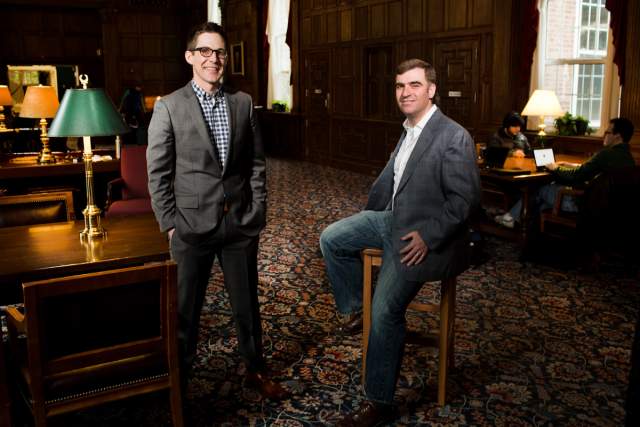Adam M. Kleinbaum Receives Research Award
Kleinbaum, an associate professor of strategy and management, won the 2018 Award for Scholarly Contribution from Administrative Science Quarterly.

Kleinbaum received the award in recognition of his research on the ripple effect of social networks and organizational behavior.
Some research papers make an immediate splash, quickly garnering attention in academic circles and beyond, but fail to stand the test of time. Others gain more and more respect as time goes by.
In September of 2012, Tuck professor Adam M. Kleinbaum published “Organizational Misfits and the Origins of Brokerage in Intrafirm Networks” in Administrative Science Quarterly, the leading scholarly journal on management and organizations. In it, he found that people with diverse and atypical career histories build broad social networks that enable them to spread information through a firm better than others with more conventional career paths. In the ensuing six years, Kleinbaum’s paper has been cited in articles ranging from e-mail communication and job burnout to the nature of family ties. In recognition of this persistent ripple effect on the study of social networks and organizational behavior, Administrative Science Quarterly has honored Kleinbaum with its 2018 Award for Scholarly Contribution.
This ASQ award is given annually for the most significant paper published in its pages in the previous five years. Kleinbaum’s paper was selected by a committee composed of members of the journal’s editorial board, and is based upon citation counts as well as “qualitative evidence of a paper’s impact on subsequent scholarship,” according to ASQ. In choosing “Organizational Misfits,” the ASQ committee praised its “well-positioned and important theoretical insight, solid collection and use of data, and methodological innovations. The paper can serve as a template for how to execute a persuasive empirical analysis of network data based on e-mail exchanges,” the committee noted.
For Kleinbaum’s part, there are two main reasons why he thinks this paper has made a significant contribution to the field. “There had been a lot of research on the consequences of having a good network,” he says, “but very little work on where network structure comes from, and why some people have diverse and far-reaching networks while others don’t, which this paper examined.” On a more methodological level, this paper was the first study that used large batches of electronic communication data (in the form of two years’ worth of emails from employees of a large IT firm) to map social networks—a practice that has subsequently become more common.
Kleinbaum, a Daniel T. Revers T’89 Faculty Fellow, joined the faculty at Tuck in 2009 and was named one of the 40 best business professors under 40 years old by Poets & Quants in 2016. His research examines the antecedents and evolution of social networks in organizations. In addition to his work on the effect of career history and personality on network structures, he has also explored the neuroscience of social networks and how the structure of a firm’s internal communication network serves to enable coordination, innovation, and firm performance. He teaches the core course Personal Leadership, the Research-to-Practice Seminar Social Networks in Organizations, and a Global Insight Expedition to Israel focused on technology, innovation, and entrepreneurship.

